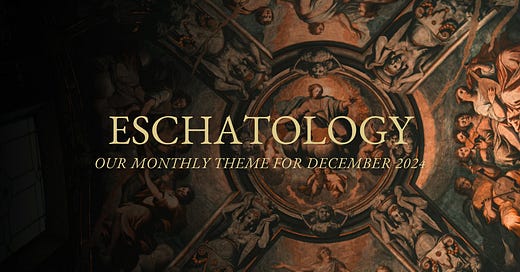A blessed Advent to you all!
The chill blanket of December sits over us now and the beginning of the Christian liturgical year lays before us; the world descends into wintry darkness and the morning star of Bethlehem ascends.
It has been quiet here since my late “October” essay, published on November 4 for our month of epistemology, but we’re jumping back in for the last month of 2024. In case you missed it, we managed to pull together three separate essays for the month of October:
On October 15, Peter Cermak posted Paths to Moral Knowledge where he explored ways in which we know the Natural Law. Be sure to read the full essay here.
“It has been argued convincingly that moral maxims such as the Ten Commandments are deducible from the self-evident first principles of the natural law, but experientially, we seem to grasp these maxims more immediately. We feel the force of them intuitively and directly, not as we might grasp the conclusions of complex strings of logical propositions, whether starting from man’s nature or a self-evident metaphysical proposition.”
On October 28, John Jakubisin posted his essay Reformed Epistemology in which he discusses the philosopher Alvin Platinga’s battle with De Jure objections to theistic belief. You can find the full essay here.
“I like to think of this thesis as follows: if we were to put ourselves in a vacuum, without any other influences, theories, proofs, opinions etc., we would still know ourselves to be a created creature. This thesis was developed chiefly by Dr. Alvin Platinga…Platinga was motivated to show that ‘belief in God can be rational without requiring arguments or evidence” and claimed “that it is difficult to prove that belief in God is irrational and [that it is] possible to suggest ways in which belief meets the requirement of rationality.’”
Lastly, on November 4, I published my essay Whom Now to Believe, an article which considers Alasdair MacIntyre’s concept of the “Epistemological Crisis” in relation to media technology and elements of thought from Marshall McLuhan and St. John Henry Newman. You can read the full piece here.
“The current state of media provokes and prolongs a sort of epistemological paralysis whereby we doom scroll social media and the news and then feel subsequently possessed to throw our phone across the room and raise our hands exclaiming “Whom now to believe?” We are flooded by propaganda from multiplying but notional narratives. This predicament has bred a generation of skeptics edging towards nihilism.”
An Exciting Announcement: Our Newest Writer
Along with the rest of the crew, I am pleased to welcome Dario Spinelli to The Broken Binnacle as our newest writer!
Dario is a fledgling lawyer, clerk on the Supreme Court of Virginia, and soon to be dad. A student of philosophy and St. Thomas Aquinas, he is always seeking to better understand the common good. "The eyes see better when guided by love." ~ Joseph Pieper
Additionally, Dario has been a long-time friend to all of us at The Broken Binnacle, is a fellow Christendom College classmate, and has been a subscriber to our Substack since August of 2023. We look forward to having him share his writing with you all and are honored to have him join our team.
And now, our monthly theme for December…
Monthly theme for December: Eschatology
You may have been hoping for a somewhat less sobering topic, something festive even, as we enter the Advent Season. Eschatology is, after all, a branch of theology concerned with the end of the world or the Eschaton. Technically, eschatology it is the study of “last things” (from the Greek word eschata). For Christians, these last things are Death, Judgement, Heaven, and Hell. I don’t know about you, but I can think of few things that pair better with Mariah Carey’s “All I Want for Christmas Is You.”
Besides the importance of considering the Eschaton in and of itself, however, Christ’s Second Coming is in fact an appropriate subject on which to meditate as we enter the story of his First Coming through the celebration of Christmas. In the Gospel reading for the first Sunday of Advent, Christ speaks of the signs that will accompany his Second Coming and enjoins to this foretelling a command:
But when these signs begin to happen,
stand erect and raise your heads
because your redemption is at hand. (Luke 21:28)
It is easy to turn immediately to the fun and comforting aspects of the approaching Christmas season—the music, the decorating, the shopping (whether this aspect is fun is of arguable of course)—but this is also a time of vigilance as much as it is a time of joyful anticipation. We must always be prepared to stand erect and raise our heads, and be attentive as Christians to the signs of the times.
The liturgical calendar offers us an opportunity to live in a deep, beautiful way the story of salvation, and yet the end of that story is more fully realized by living through the story, by re-enacting it in a bodily way, which for us is still ongoing as we make our way through this life with all its joys and sorrows. As such, the Advent season invites us to enter ever more deeply into our earthly pilgrimage through space and time and beyond as we journey with the Holy Family to the small Judaic town of Bethlehem.
The atmosphere of Advent, furthermore, gives us an opportunity to practice eschatological vigilance as well as patience, but there is no reason we should not do this joyfully. Both Christmas and the Eschaton remind us to look out for the coming of Christ with patience and hope. Both events should enflame our hearts as the heart of the Bride does as she lovingly anticipates the approach of her Bridegroom—a Bridegroom who has first loved us, loves us more than we could ever love him, and who has already suffered and conquered sin and death for each of us. O Come, O Come, Emmanual.
May we be vigilant and may we rejoice!






